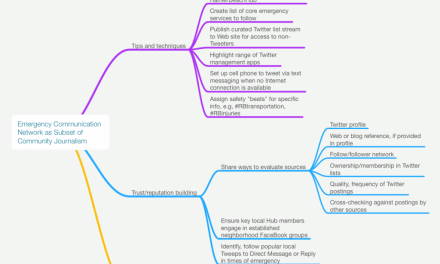Today, virtually every family lives in diaspora; and the population of most neighborhoods and communities seems to be churning at an accelerating pace, largely driven by the severity of economic conditions, but also influenced by political and cultural pressures.
When I lived in a rural Oklahoma town back in the 1980’s, anyone who had resided there less than 20 years was still considered a “newcomer.” Now, after about nineteen years, my wife and I have lived in the same Seattle home longer than either of us have lived anywhere before, and we’re among only a handful of folks who have remained in our blockwatch group over that period of time. The rest have “aged out” or moved on to new jobs or schools. Some of the nearby homes have hosted two or three different families since we arrived in 1992.
Way back in my ice cream plant days, there were folks on the production line who had been filling half-gallon packages and packing novelties for nearly 30 years. None of the plants I worked in exist any more. Most were closed long ago.
Growing up, I was able to walk to every school I attended. Many of the kids from my elementary school were still in the same home room in high school, and a bunch of us made our way together through the scouting ranks from Wolves, Bears and Lions up to Explorer scouts (not many Eagles in my circle!). That world doesn’t even seem real now, and I’m certainly not making a case for going back. There is no going back.
Robert Putnam of “Bowling Alone” fame has blamed the advent of television for the erosion of “social capital” and civic cohesion, but I suspect the reality is far more pervasive and complex. For many reasons, it has simply become less risky for folks to maintain their distance, scrupulously reserve their level of participation, and just walk away when interest flags. And while there is certainly truth in the mandate to “follow your own passion,” it has become almost too easy to not follow any “passion” at all for too long (at least until retirement), for fear of choosing the wrong one and ending up at a dead end with less energy and resources than when first setting out. And certainly there is the impact of exploding variety in goods, areas of specialization, and information that can seem daunting and paralyzing.
Yet, while many purists of one kind or another bemoan the explosion and apparent shallowness of social networking, I think we may be witnessing the stirrings of a new community consciousness, the foundations of a new social cohesiveness, and perhaps, a new framework for civic engagement that can encompass and heal the fractured compartmentalization of daily life into work and “everything else.”
Venturing further, I see the emergence of a new ethic of commitment, in which personal development and self-realization are no longer seen in opposition to community involvement, in which a deepening sense of interconnection is requiring people to be present, to take stands, to connect beyond their immediate comfort level, to place themselves in situations and relationships that require intense introspection and flexibility, with a resolve to not walk away, indeed, a growing acknowledgment that walking away is simply not an option.
Granted, I may be grossly over-reading the trends, and much of what is visible remains tentative, exploratory, and fragile. I see cause-based communities–whether focused on the environment, social justice, or political transformation–as impatient steps in this direction, but not yet inclusive enough for the most part to firmly weld new resilient bonds of profound, life-long association.
Yet in my own journey, there has been a decisive shift over time from “figuring out” my own life to accepting the adventure of the journey, recognizing I may or may not know at any given time “what is best for me,” appreciating the surprising turns (pleasant and not so pleasant) that challenge old prejudices and boundaries and reveal unexpected connection and opportunity.
This ethic of commitment springs from an acknowledgment of “right exchange,” an immediate and unbridled giving back for what has been received as a single circulation or flow of energy, beyond any “personal significance or insignificance” [jeez, sorry-this is an utter travesty of “stolen goods,” completely reframing Lincoln’s admonishment to the Civil War Congress as “even we here who hold the power and bear the responsibility”–but this strikes at the point I am trying to make].
How this “ethic” differs from an ideology, a list of values, mission statements, etc., will be explored in later postings.
Yet I am confident that cultivating this ethic of commitment lies at the core of determining one’s own participation as well as eliciting and sustaining the participation of others. This is the fertile ground for emerging patterns of engagement, a new blossoming of creativity, resilience, and, yes, human community.



